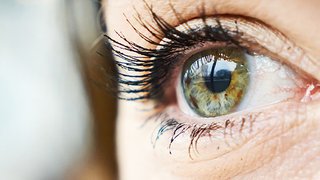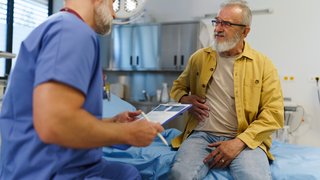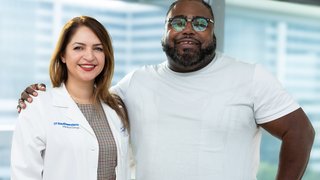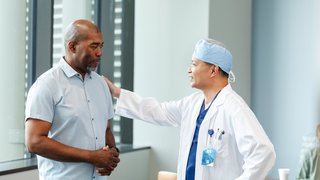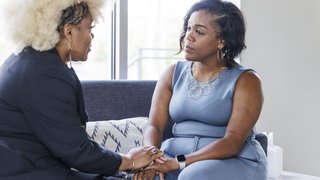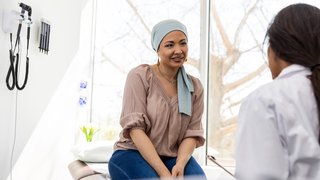Cancer Prevention Myths and the Real Truths
May 3, 2019
What the latest science says about cancer prevention
From aspirin to exercise to sun exposure, here’s what you need to know about reducing your risk of cancer.

Social media streams and news headlines grab our attention with the latest cancer prevention strategies. But how do we sort the scams from the science? We asked Celette Sugg Skinner, Ph.D., Associate Director for Cancer Control and Population Science at Simmons Comprehensive Cancer Center, and Professor and Chair of Clinical Sciences, to help clear up some common falsehoods about the disease.
I should eat only organic food.
What we know: “I don’t think there’s any question that environmental toxins are related to cancer. We just don’t know enough about what is and isn’t toxic,” Dr. Skinner says. There are lots of different factors to tease apart, and they can affect people differently. It’s really hard to measure what people have been exposed to over the course of their lives, so this is a challenging topic to study.
“The reason recommendations change is because we get new and better information.”
Celette Sugg Skinner, Ph.D.Associate Director for Cancer Control and Population Science at Simmons Comprehensive Cancer Center, and Professor and Chair of Clinical Sciences
To reduce my risk of skin cancer, I should avoid the sun.
What we know: To help prevent some cancers you need vitamin D. “The best way to get it is from the sun,” Dr. Skinner says. You want to limit your exposure and avoid dangerous sunburns. “But totally covering every part of your body so your skin is never exposed is not the way to go,” she says. Talk to your doctor about what constitutes a safe amount of exposure for you.
Only adolescent girls need the HPV vaccine.
What we know: The human papillomavirus, or HPV, vaccine is recommended for everyone beginning at age 11 or 12. “It doesn’t prevent only cervical cancer – there are multiple HPV-related cancers, and about 30,000 are diagnosed in the United States every year, in both men and women,” Dr. Skinner says.
If you didn’t get the vaccine, it might not be too late. It’s approved up to age 45, though it’s best to get it before you may have been exposed to the virus through sexual contact.
Being overweight is bad for my heart, but it doesn’t affect my cancer risk.
What we know: “Being overweight often leads to inflammation, and inflammation is linked to many types of cancers,” Dr. Skinner says. It’s important to maintain a normal weight at all ages. Obesity is linked with cancers of the uterus, esophagus, stomach, liver, kidney, brain (meningioma), pancreas, colon and rectum, gallbladder, breast, ovary, and thyroid.
Men should have no more than two alcoholic drinks a day, and women should have no more than one.
What we know: “Heavy alcohol consumption is a risk factor for some cancers,” Dr. Skinner says. “We don’t know exactly how much is too much, but moderation is always wise.”
Drinking coffee increases my cancer risk.
What we know: “We all grew up thinking coffee must be bad,” Dr. Skinner says. “But drinking coffee is associated with lower cancer risks, even among heavy coffee drinkers.”
Exercise is good for me in lots of ways, but it’s not linked with cancer.
What we know: Exercise can help reduce your risk of cancer. “We don’t have a complete understanding, but it’s not only because it helps you lose weight,” Dr. Skinner says. There is a benefit from the physical activity itself. About 30 minutes of moderate activity most days is ideal, but any amount is beneficial. And even if you exercise, it’s still important to get up and move around periodically throughout the day rather than sit for long periods of time.
The One Change to Make to Reduce Your Cancer Risk
“Don’t use tobacco products,” says Celette Sugg Skinner, Ph.D., of UT Southwestern’s Simmons Comprehensive Cancer Center. If you’re a smoker, you’ve probably tried to quit before. Don’t give up – new medications and programs can up the odds that you’ll succeed. The good news is, it’s never too late to quit! No matter how long you’ve smoked, there’s still a benefit to stopping. Learn how UT Southwestern’s free tobacco-cessation program can help.
I should take supplements to build my microbiome.
What we know: “We’re finding that the microbiome is important for cancer risk,” Dr. Skinner says. “But contrary to what the people selling supplements say, we don’t know exactly how to make it better.” Eating a lot of fiber and avoiding unnecessary antibiotics are probably beneficial. Eating some cultured foods like yogurt and sauerkraut is also probably a good idea.
I don’t need to take a low-dose aspirin because I’m not at high risk for heart disease.
What we know: “Some people might benefit from a low-dose aspirin to help reduce the risk of colorectal cancer and possibly other types of cancer,” Dr. Skinner says. Talk to your doctor about whether aspirin is right for you.
There’s no point in following recommendations – they keep changing.
What we know: “The reason recommendations change is because we get new and better information,” Dr. Skinner says. For example, it used to look like women needed a Pap test every year. Research has now found that, for most women, once every three years is fine. “That doesn’t mean we don’t know what we’re talking about. It means we know more about what we’re talking about,” she says.



